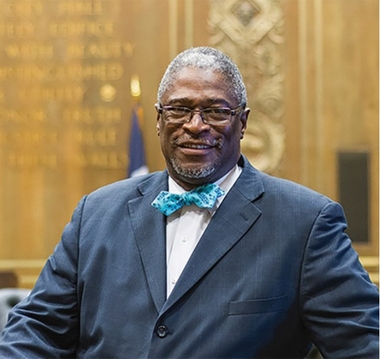The two sides of Kansas City aren’t so equal

by Sara Ritsch
Staff Writer
Kansas City, Missouri scored a perfect 100 on the Human Rights Campaign (HRC) 2015 Municipal Equality Index (MEI), HRC’s rating for a city’s potential for LGBT equality. In contrast, Kansas City, Kansas scored a shocking 24 percent.
What could be the reason for this discrepancy? The separation between the two cities is nearly unrecognizable to the rest of the country, but to Kansas City residents, the distinction is more than just a line drawn in the sand.
Mayor Sly James of Kansas City, Missouri (KCMO) grew up in Kansas City, and as a native he has shown he knows exactly in what direction the city should go. He is incredibly progressive and attributes this success entirely to the citizens of Kansas City.
Chris Hernandez, city spokesperson, says both the residents and KCMO’s city leadership can be credited for this high score.
“It’s beyond being a progressive city, which we are; but I think top leadership here understands that for our employees to function at their best, we need to be comfortable with who we are as individuals. Our top leadership is setting an example that this is a city that cares about each and every person.
“I’m the chief spokesperson for the city and I’m openly gay. They knew when they hired me, and there was no hesitation to have me represent the city as a whole – which is my job.”
The MEI scorecard covers five sections: Non-Discrimination Laws, Municipality as Employer (LGBT employee protections), Municipal Services (LGBT constituent programs), Law Enforcement and Relationship with the LGBT Community.
KCMO scored bonus points for several endeavors. They were awarded a bonus for being a welcoming place to work and for enacting an enforcement mechanism in the Human Rights Commission. They provided services to LGBT youth, homeless and people living with HIV/AIDS. They also had LGBT elected or appointed municipal leaders. This is partly in reference to District 4 City Councilmember Jolie Justus, who is openly gay.
“The mayor’s office makes a steadfast effort to ensure all members of the community are represented. Equal representation,” Hernandez says, also noting racial minorities.
The only area that lacked was transgender-inclusive healthcare benefits, which they vow to work on.
“We’ve always acknowledged that it’s nice to get the perfect score, but we realize there is continuous work to do. It’s not a one-time thing. It’s an ongoing relationship,” Hernandez says.
Now, how can it possibly be that the Missouri side of such a progressive city is more LGBT inclusive than its Kansas counterpart?
This 24 percent score on Kansas City, Kansas’ MEI could be attributed partly to their state government, but a distinction is that KCK has a different mayor than ol’ Sly James. Theirs is Mayor Mark Holland, Democrat, Reverend and CEO of the Unified Government of Wyandotte County.
Since Holland has been in office, the score has raised from a whopping zero.
“It’s a huge improvement,” Holland says. “We were at zero three years ago. We’re working steadily to increase that score. We’ve added protections to employees, but the next step is to rebuild the infrastructure around our Human Rights Commission, which has been defunded. If we’re going to actually implement more changes, we’re going to have to build to monitor and enforce it.”
KCK scored a zero on Non-Discrimination Laws. They lacked both transgender-inclusive healthcare benefits and city contractor non-discrimination ordinances. They had no LGBT police liaison or task force and zero reported hate crime statistics to the FBI. They were also awarded no bonuses. They do, however, have an openly gay judge, Kate Lynch, who is a good friend of Holland.
Holland remarks that his immediate focus has been on the racial makeup and gender diversity of the police and fire departments.
“Looking at a spectrum of justice issues, you don’t prioritize – you take the ones in front of you and work through them.”
Holland advocated for the ordination of LGBT people in the church and for LGBT inclusion at the UMC’s most recent conference over their Book of Discipline. Unfortunately, the discussion was deferred four more years.
“I’ve been supportive for over 20 years of ordination and marriage for gays and lesbians. I’m actively working towards that end. It’s something I feel passionately about. The UMC is one of the few [denominations] that does ordain women but does not recognize gay and lesbian rights. There are a lot of peculiarities as to why that’s true, but we’re certainly working in that direction.”
A sigh of relief can be breathed in knowing that the UMC does not influence Holland’s decision to work towards an LGBT friendly city.
“Kansas has not been very progressive or where LGBT people have felt welcome. It’s important for there to be a church in the city where LGBT people are welcomed and celebrated.” Holland preaches at Trinity Community Church in KCK.
KCK residents can look forward to a score to match KCMO’s. As Mark Wiebe, KCK’s Director of Public Affairs says about Missouri’s perfect 100 next to Kansas’ 24, “Well, we can’t let that happen!”
Let’s take a look at the scores of other cities in The Gayly’s region:
Arkansas
Fayetteville 76
Fort Smith 18
Little Rock 46
Kansas
Kansas City 24
Topeka 24
Wichita 21
Missouri
Kansas City 100
Springfield 28
Oklahoma
Oklahoma City 29
Norman 43
Tulsa 35
Stillwater 12
Texas
Amarillo 17
Dallas 100
Fort Worth 99
The Gayly – July 15, 2016 @ 1:25 p.m.





